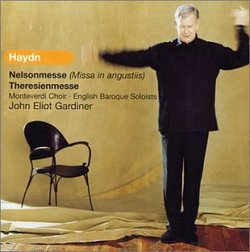| All Artists: Franz Joseph Haydn, John Eliot Gardiner, English Baroque Soloists, Sally Bruce-Payne, Donna Brown, Peter Butterfield Title: Haydn: Nelsonmesse; Theresienmesse Members Wishing: 0 Total Copies: 0 Label: Philips Import Release Date: 1/14/2003 Album Type: Import Genre: Classical Styles: Opera & Classical Vocal, Historical Periods, Classical (c.1770-1830), Sacred & Religious Number of Discs: 2 SwapaCD Credits: 2 UPC: 028947028628 |
Search - Franz Joseph Haydn, John Eliot Gardiner, English Baroque Soloists :: Haydn: Nelsonmesse; Theresienmesse
 | Franz Joseph Haydn, John Eliot Gardiner, English Baroque Soloists Haydn: Nelsonmesse; Theresienmesse Genre: Classical
John Eliot Gardiner continues his survey of Haydn's later Masses with this pairing of the much celebrated Nelson Mass--more properly known as Missa in angustiis--and the Theresienmesse. Written in 1798, as the Latin title ... more » |
Larger Image |
CD Details
Synopsis
Amazon.com
John Eliot Gardiner continues his survey of Haydn's later Masses with this pairing of the much celebrated Nelson Mass--more properly known as Missa in angustiis--and the Theresienmesse. Written in 1798, as the Latin title has it, during straitened times, the Nelson Mass has long been associated with a performance given two years later at the Esterhazy palace when the victor of the Nile, along with Lady and Sir William Hamilton, paid a visit there. Its prominent timpani and trumpets ring forth with a series of resplendent fanfares that have firmly established the work as one of Haydn's most enduringly popular. The Theresienmesse, composed a year later, is a more intimate piece, with clarinets to soften the scoring and extended roles for the soloists. The brief Te Deum, in the brightly lit key of C major, makes an appropriate companion to Nelson on the first disc. Eliot Gardiner brings his usual refreshingly astringent approach to these works, driving the music hard and pushing his singers to clarify every nuance. The result will sound a little acerbic for some ears, especially those not yet accustomed to period performance, but there's no doubting the conductor's commitment to seeking out the very heart of this repertoire. Those staccato trumpet fanfares in the "Benedictus" of the Missa in angustiis have never sounded quite so nakedly aggressive, and the buildup to them never so spine-tingling (thanks also to the pristine sound recording, stripped bare of woolly reverberation). The band, choir, and soloists are impeccable, of course. Even those who remain faithful to Trevor Pinnock's benchmark account of the Nelson will find that Eliot Gardiner, as ever, has something new to add. --Mark Walker

 Track Listings (12) - Disc #1
Track Listings (12) - Disc #1